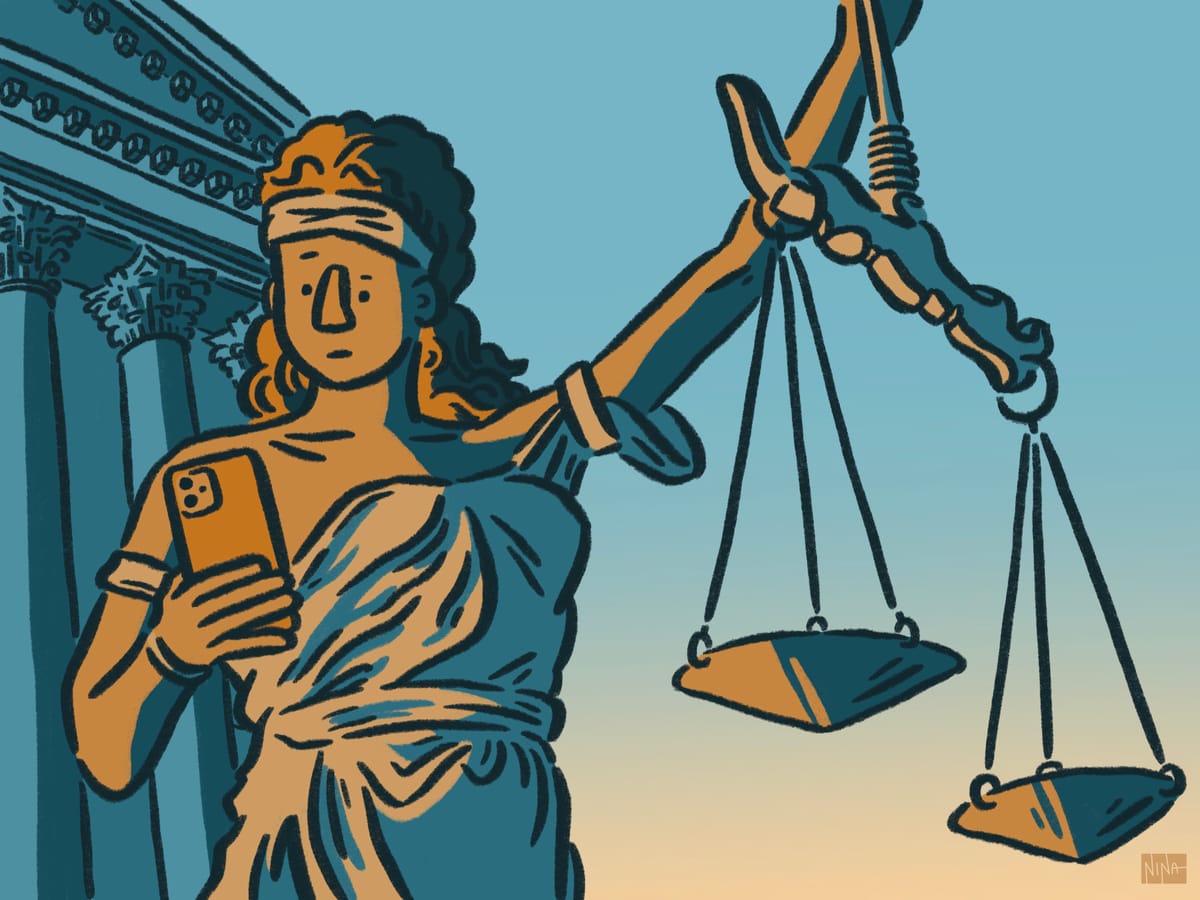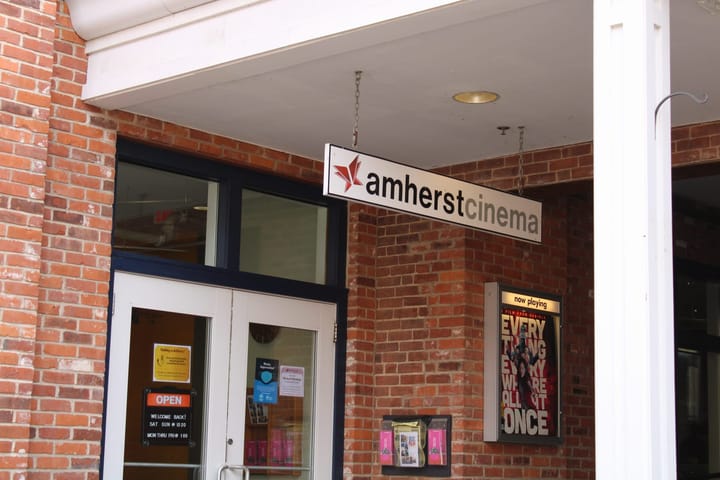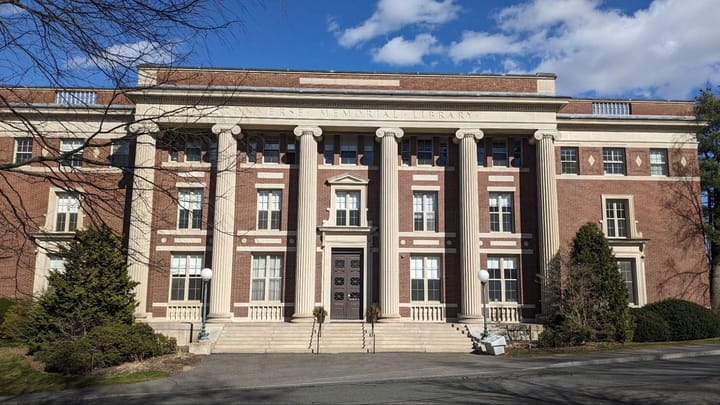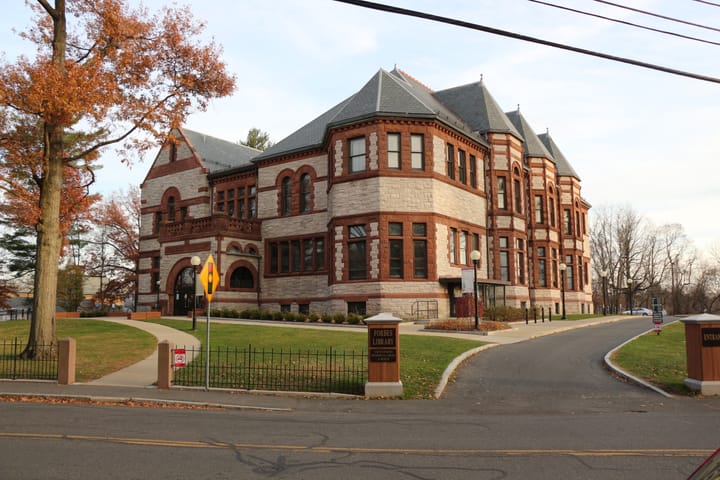Pro-democracy Initiatives Seek To Engage Apathetic Student Body
With democracy on the ballot in Tuesday’s midterms, The Student interviewed community members on the state of political engagement on campus. Although several reported a concerning level of apathy and detachment, community leaders also spoke about efforts to renew engagement and faith in democracy.

Just a few weeks after President Michael Elliott declared in his commencement address that democracy was “under attack in the U.S. and around the world” and in need of “leaders who have received an education in the liberal arts,” Amalia Roy ’23 walked into Amherst College Democrats’ (AC Dems) first meeting of the semester to find the club’s president sitting alone in an empty room. Not a single student had shown up.
To some, that empty classroom is indicative of a larger problem at Amherst. Ahead of Tuesday’s midterm elections, which many political observers considered a crucial referendum on democracy, The Student interviewed a number of members of the college community on the state of political engagement on campus. In general, students described a student body that is smart, interested in politics, and committed to issues like social and environmental justice, yet strangely detached from democratic processes, both within the college and beyond it.
But the interviews also suggested that students are broadly aware of the problem of political apathy on campus, and there are clear signs — including the formation of a new club, Amherst College Students for Democracy (ASFD) — that some student leaders are attempting to inspire a renewed faith in democracy.
Roy, who arrived at Amherst in 2017 and returned to campus this year after two gap years during the pandemic, described coming back to “a completely different school” this fall, one with fewer political events and less open debate. When she left to study abroad in 2019, AC Dems and Amherst College Republicans (AC Republicans) still had large presences on campus. She recalled how AC Dems went to work knocking on doors to help flip a House seat in New York in 2018, and how AC Republicans brought former Attorney General Jeff Sessions to campus in 2019, sparking a massive walkout, neither of which she could imagine happening today.
However, she said that even before the pandemic, students were noticing low and declining engagement in political issues, both on and off campus. She referenced a 2018 article in the now-defunct student publication AC Voice diagnosing the campus with a “malaise” and also pointing to declining engagement in the Association of Amherst Students (AAS).
Lucas Romualdo ’24, the president of AC Dems, has observed a similar decline in participation. He remembers being told by seniors during his first year at Amherst about meetings of the Amherst Political Union (APU) during the Brett Kavanaugh confirmation hearings in 2018 that drew “50, 60, 70 people.” Though this moment has not been short of political intrigue, these days, he said, the group typically draws around 10 participants.
The president of APU, Melanie Schwimmer ’23, cautioned, however, that APU attendance may not be the best metric of students’ political feelings. “I worry about people saying, ‘Oh, the participation APU is low, therefore people don’t care about politics,’” she said. “I think that people might not want to come and talk about politics for an hour. But that doesn’t mean they don’t want to engage.”
She also conceded, though, that engagement with political groups has decreased across her time at Amherst, which she partly connected to “a decrease in club participation across the board.”
Lower participation prevented AC Dems from doing the kind of get-out-the-vote work that it would typically engage in ahead of yesterday’s midterm elections. It did not hold phone banking events this fall after its phone-banks last semester drew low attendance.
The lack of engagement with the midterm elections was distressing to Olivia Ward ’23, the president of Amherst College Votes (AC Votes), which helps students register to vote and cast their ballots. She sees these midterms as “crazily important in terms of just election integrity and keeping democracy alive.”
Her words echoed those of President Joe Biden, who cast the election in existential terms, pointing to the presence of hundreds of 2020 election deniers on ballots across the country, and declared last week that “democracy is on the ballot” in yesterday’s elections.
The lack of engagement observed by political-club leaders seems to extend to the college’s on-campus democratic body. While the AAS controls club funding, spearheads many student-oriented initiatives, and holds a direct line to the college’s administration, only around a quarter of students voted in last spring’s Senate elections. The junior and senior races had exactly as many candidates as open Senate seats.
At this Monday’s Senate meeting, AAS Vice-President Jaden Richards ’25 resigned from his position, citing personal difficulties among senators and a general inability to engage in respectful debate. In an interview with The Student, he expressed disappointment with the body’s lack of open discourse. “Most votes in AAS are unanimous,” he said. “And they’re unanimous because senators in AAS quite clearly feel very afraid to be in disagreement.”
Without discourse, he added, “you’re not making the right decision. You’re just making the decision that the loudest people want to make.”
Richards sees student government as an opportunity for students to “sharpen” themselves before tackling the problems of the broader society. Ideally, he said, it would prepare both voters and senators for futures as democratic citizens and leaders.
However, Richards said that, throughout his time at AAS, he never felt that the student body particularly cared about his work. “Students aren’t interested in student government,” he said.
Frustrated, he said he understood that “I can’t make them interested. If you want something to serve you, you have to buy in a little and care about it.” The fact that many students do not care is sometimes discussed among senators, he said. “It’s something that lots of people in Senate really wonder about.”
For Richards, the problem runs deeper than just AAS and is indicative of a community more committed to personal ambition than a set of shared values or a purpose. “You have many students here who genuinely believe a topic is not worth learning unless it gets you a job,” he said. “How are they going to be the ones contributing to democracy?”
Ross Kilpatrick ’24E similarly said he believed that the campus’s lackluster political environment is a function of a campus that brings together “a lot of people who are hyper-ambitious.” Though many students feel strongly about certain issues, very few seem willing to devote their lives to public service. He worried that some political engagement is largely inspired by students’ desires to beef up their resumes for jobs in the private sector. Some students “us[ing] all the jingoism of liberalism to leverage that into a position at extremely high-paying institutions,” such as consulting firms, he said.
Kilpatrick founded a new publication, The Amherst Contra, last semester in an attempt to address what he sees as a lack of political discourse and debate on campus, another issue that often came up in interviews. He cited John Stuart Mill’s idea that social suppression of speech is “stronger than any kind of governmental policy” and said he hopes that by publishing controversial opinions, often by writers who are granted anonymity, the publication can foster greater dialogue on campus.
Since its inception, The Contra has been the subject of controversy on campus, drawing criticism from some that it gives a platform to views that are excessively inflammatory and divisive, though Kilpatrick said that he has heard more positive reactions to the publication than negative.
Nonetheless, he lamented that some Amherst students are “very dismissive of the idea that you need disagreement to form correct opinions” and hopes that The Contra would allow students to engage with the counter argument to their assumptions and beliefs.
Other students agreed that the lack of political diversity on campus disincentivizes political engagement. Roy said that, before the pandemic, debate and conflict between AC Dems and AC Republicans contributed to a feeling of political energy on campus. Since 2019, though — when offensive messages from AC Republicans’ GroupMe were leaked to The Student and AAS forced members of the club’s e-board to step down — the club has been “in hiding.”
Romualdo said that the lack of a voice on the other side of the aisle made it harder to organize Democrats. “There’s not a whole lot of reason to have Democratic activism on campus if there are no Republican activists,” he said. “What are you fighting for?”
Romauldo added that he is often one of the furthest right voices in political discussions as a center-left Democrat who supported Michael Bloomberg in the 2020 democratic primary. “That’s a little crazy to me,” he said.
Students remembered a number of prominent conservative voices brought to campus in the past, including Sessions in 2019 and right-wing political commentator Dinesh D’Souza in 2015. There have been few conservatives on campus in recent years, however. This year’s “Point/Counterpoint” speaker series, titled “Democracy at a Crossroad,” is paid for by the “Seminars on Opposing Views Fund,” although the three speakers it has featured, Congressman Jamie Raskin, Atlantic columnist George Packer, and Harvard Professor Danielle Allen, hold views that could broadly be placed in the left wing of the Democratic party.
Schwimmer argued, however, that simply bringing more conservative figures to campus would not necessarily fix the problem and might be “giving a platform to white supremacy or … supporting authoritarianism.”
Nevertheless, she still worried that “that there isn’t a space for people to engage in intellectual debate about issues.”
Some members of the college community are increasingly concerned of the mismatch between the level of political energy on campus and existential issues at stake in current politics.
Austin Sarat, the William Nelson Cromwell professor of jurisprudence and political science, is teaching a class this semester called the “Death of American Democracy.” The course examines the current threats to American institutions and norms, which Sarat argues come, to some extent, from both sides of the political spectrum, in part because people fail to empathize with each other and disagree constructively.
On the first day of class this year, he pitched the idea of a club that would encourage Amherst students to intern with groups engaged in work that promotes democracy. A few months later, several students who have performed research alongside Sarat announced the new organization, ASFD, whose main goal is to roll out a “pledge” next semester asking students to devote one summer, semester, or January break to a democracy-related internship. Sarat has said that he is working with Loeb Center to find internships with organizations engaged in this work.
ASFD’s first meeting was held immediately after the George Packer “Democracy at a Crossroads” event on Nov. 3, where an impromptu conversation between Packer and Sarat highlighted two different beliefs about students’ role in democracy. Though both men agreed that American democracy is in crisis, Packer argued that college students already had a lot on their plates, and that saving democracy need not be added on top.
“There’s a limit to what you can do right now,” Packer said. He recommended, instead, that students endeavor “to embody it, to practice it, to go about your life, your relationships, your class time in a democratic spirit.”
Before the room of students and Packer, Sarat took issue with this, arguing that there was “an emergency” and that students “need to do something now.”
In an interview with The Student, Sarat doubled down, although he acknowledged democracy’s shortcomings. “The promise of democracy has not been realized, meaning democracy requires inclusion,” he said. “All kinds of people and groups are excluded from democratic participation.”
But he maintained that students still need to take an active role in democracy in order to effect the social change they care about. “If you care about environmental justice, you ain’t gonna get it unless you have a functioning democracy,” he said. “If you care about racial justice, gender justice, economic equality, you’re not going to get those things if you don’t have a functioning democracy.”
His work with ASFD, though, isn’t about winning over those who are disillusioned with democracy. “My hope for the pledge is that we move students away from thinking voting is enough,” he said. “It ain’t enough.”
One of the students who was inspired by Sarat to become a leader of ASFD, Theo Dassin ’24, emphasized that the club isn’t just about upholding the current American political system, either. “It’s about, in some ways, trying to change our current political system to be more democratic, to do things like trying to fight against voter suppression, to do things like fight against gerrymandering,” he said. “But, also, a goal of the club is to help people understand that democracy is not just politics.”
The students who spoke with The Student had a range of views on ASFD’s proposals.
Charlie Sutherby ’23E, who attended the opening ASFD meeting, leads the Better Amherst Initiative, a movement that aims to increase the number of Amherst students who pursue careers in public service. He believes making change requires convincing students that there is a problem, but also showing them that it is a “changeable problem.” Amherst students, he suggested, recognize that there is a problem with democracy but often get hung up on the immensity of it.
He said he hoped that the internships students pursued through the ASFD initiative would “demonstrate that not only is change possible, but that it's possible relatively soon for you to go have an impact at a place like Common Cause of New York.”
Richards, the former AAS vice-president, tended to agree with Packer. “It’s hard to be a college student,” he said. “College students should focus first on learning and becoming the people who can defend democracy. I don’t think any of us right now are capable of doing that.”
Mollie Hartenstein ’23, an AAS senator engaged in campus activism, took issue with the initiative for its emphasis on career advancement. “It’s very upsetting for me, as a person who cares about these issues and has been trying to push these issues on campus, that it takes someone who has so much institutional and real life power as Austin Sarat to call up people to get these fancy-schmancy opportunities for kids to make people care about issues that probably they should be caring about already.”
She also problematized what she saw as the initiative’s overly narrow conception of democracy and questioned whether the status quo of American politics even deserves saving. “There’s this idea that there’s this time of [fully-realized] American democracy that we can go back to,” she said. “And I don’t know if I believe that.”
She argued that there were more kinds of democracy than national elections, many of which take place right on campus. She pointed to the diversity, equity, inclusion steering committees that have been established for every single department at Amherst and on which students can serve; to the Amherst Labor Alliance, which she said is “doing work to increase democracy between staff and faculty and students”; to campus affinity groups working “to change campus policies for the better”; to the poorly-attended public comment segment of every AAS meeting; and to yearly AAS elections where upperclassmen senators often run unopposed.
Hartenstein said she believed that the true way to fix democracy and combat political apathy is to increase engagement on a smaller scale. “People need to shift their view of democracy from voting for a Democrat to making change at a local level,” she said. Schwimmer, the APU’s president, also emphasized the undervalued importance of local politics.
“People are not going to be motivated to do large scale democracy in the right way without these local changes, too, because they don’t know what it means or what the importance of it is,” said Hartenstein.
“We have the channels at Amherst to do those things,” she added. “It is a necessary part of this goal of increasing awareness about democracy.”
Despite widespread acknowledgement of students’ detachment from democracy, and many initiatives intended to increase engagement, the community members interviewed seemed skeptical that simply creating more opportunities for engagement on and off campus could fully address the underlying apathy.
President Michael Elliott, whom The Student spoke to in light of his public advocation of the liberal arts’ importance for democracy, was asked whether there’s a role for the administration, rather than just students, in “fixing” the Amherst community’s sense of apathy.
“I’m gonna do a very Amherst thing,” he responded. “I’m going to question the premise of your question, or at least give you a different way to think about it. Think of it less as a problem to be fixed and more as a situation to be improved. It won’t be improved by any student or, for that matter, faculty member or administrator as individuals. It really is about what kind of community we have.”
“Democracy will always be challenged,” Elliott continued. “It’s always unstable. It’s always under threat of one kind or another. And the meaning of it will also change. One of the things Amherst should provide is a place for students to talk broadly about what democracy is and what it should be. If we’re all asking questions, and we’re worried about it together, then that itself seems like something of an improvement.”





Comments ()